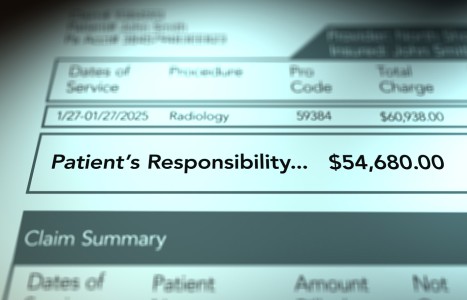Recent laws in New Jersey and California represent a disturbing trend that will negatively impact a practice’s ability to collect monies from patients, as well as expose them to significant penalties if the practice does not follow the mandatory guidelines to a T. Please be aware that a similar law may be coming to your state. The time to act is before the law is passed.
Tips on Doing a Deposition - The Doctor's View
(Author's note: The author is not an attorney, and this article does not constitute legal advice. It has been written for educational and informational purposes, for practicing doctors who may be called upon to have a deposition taken.)
Any doctor who has had his or her deposition taken will tell you one thing: You need to be prepared. As the world gets more litigious, and third-party payers take an increasingly hard stand against payment, it is quite possible that you will have occasion to give a deposition. The following, written from a doctor's perspective, is meant to help prepare you for such an event.
Setting the Stage
Depositions for court cases often have a videographer recording everything, as well as a court reporter taking things down by hand. Because there is a video record of the event, how you look matters, as well as what you say and how you say it.
First and foremost, in terms of your appearance, is your manner of dress. Business attire (i.e., a clean, pressed shirt, preferably white or pastel, a nice, fashionable tie, and a dark business suit) is appropriate. Dressing casually (i.e., just a shirt and slacks) may be seen as a sign of disrespect to the Court and potential jurors, and let's face it, people expect a professional to be dressed in a suit and tie. Studies have found that the color of the suit often acts as a visual cue of your status to the observer. Right or wrong, black or dark navy blue suits are seen as representing a high level of authority, whereas white, light brown, etc., are associated with a lower rank of authority. The tie should match the shirt and suit; it can be colorful, but you want to avoid comical or garish designs, which will distract attention from you and what you are saying. Your attire, and all of the elements thereof, need to reinforce your basic message - you are a professional, and you are serious about your testimony and your profession.
This message should follow through to your body language. If you have any tics or habitual gestures that may be distracting or take away from your presentation and believability, you need to work on eliminating them. You need to present yourself in a friendly, nonconfrontational manner. You have to remember that although you are doing this deposition in the opposing attorney's office, it can end up being shown before a jury in a court setting. You need to present yourself as a learned professional and as a nice, reasonable person. Being confrontational and overly argumentative with the attorney won't help your presentation.
Getting Off the Impeachment Track
The goal of the other side's attorney is to discredit you and make your testimony seem less than trustworthy. It has always seemed a bit humorous that when they take your deposition, they "depose" you. The first definition of the word depose at dictionary.com is "to remove from office or power. To dethrone." In subsequent definitions, the word is defined as "taking the deposition of someone." But with regard to the way in which the attorney for the other side approaches this situation, it certainly does seem as if he or she is trying to "dethrone" you or take away your authority.
One way the opposing counsel goes about this is by getting you on an impeachment track. Basically, the attorney, or a legal assistant skilled in research, will develop a series of exhibits and questions that try to show that you have made prior inconsistent testimony, or that authorities in the field who you may have studied under, or quoted, or who have written learned treatises in the field, have said things that would contradict what you are testifying about. These questions may be fired at you one after another, to try to build a case for impeaching your testimony. (Impeach usually means "to challenge the validity or credibility of a witness.")
The only way to prepare for this possible impeachment is to review everything you have stated or committed to writing in the past few years, and look for contradictions or inconsistencies in your own statements. Most attorneys representing you or your patient will usually have a conference with you prior to a deposition, but you have a responsibility to prepare yourself, and you can do that better than any attorney, because you know where to look for your past statements.
What You Say Can Come Back to Haunt You
Many of us change our opinions on one thing or another over the years; in fact, as a scientist in health care, it is appropriate to change your viewpoint when research comes to your attention that shows you that perhaps a previous statement was incorrect. The problem is that once you write something in a patient's record or a narrative, or publish it in a book, it is basically frozen in stone, and if you change your mind pursuant to new information, the opposition will try to present this discrepancy in court as an inconsistent statement. Therefore, it is a good idea to review your previous statements; if you now are taking a different stand on anything, be ready to reconcile the change(s) in a reasonable fashion.
Issue Your Words Like Each One Costs $100
Let's face it: Some of us are wordy and long-winded. While that may be good when writing narratives or articles, most lawyers will tell you that being wordy, taking the long way around answering something, or giving too much information in an answer is not good.
Answer a question with as few words as possible, and then stop. This is one case where less is more. Don't go on and on explaining your answer. Try to answer in layman's terms unless medical jargon is required. Remember, the ultimate target of your answers is a lay audience. They aren't impressed by your use of medical terms; they just want an understandable and reasonable answer to what you are asked.
Watch What You Say on Your Web Site
We are in an exploding age of information on the Internet, and many doctors are now erecting Web pages for their practices, or writing for journals that are posted online. Remember, the Internet is open to anyone with a connection and a computer. That means your Web page(s) are available on the Net to opposing counsel, so you need to review the material for consistency and validity. Make sure that the material on your site obeys the applicable laws in your state; that the scope of practice you present agrees with the scope of practice in your state; and that you make no representation you cannot back up with facts.
Dredging Up Past Grades and Your File With the Board
One thing that seems fairly common is for opposing attorneys to request a copy of your entire professional file from your state board of chiropractic examiners. They are looking for anything and everything they can use against you. Get a current copy of your file and check for anything opposing counsel may bring up in a deposition. One thing the other side seems to take perverse pleasure in is highlighting any low grades you made as an undergraduate or in chiropractic school. Sure, it has nothing to do with anything, because you obviously did well enough to graduate and get a license. So, why do they do it? Because they want you to get rattled, and they want to try to get you in a defensive mode or break your confidence by pointing out that you made a "C" in something. The best way to deal with this is to admit it, look at them as if to say, "OK, and your point is?" and smile.
Make Them the Jerks, Not You
In many ways, the deposition is like the other side is auditioning you as a witness. Opposing counsel wants to see you under pressure and see how you field questions; it wants to discredit you before the jury. If you are prepared, confident, friendly and professional, the attorney for the other side may get upset and a bit rattled. Generally, the more opposing counsel gets frustrated with you, the angrier he or she will become - toward you. This becomes evident to the invisible jury, and suddenly, you are the poor, friendly, helpful doctor who is being attacked. You become the victim of the attorney who is battering you, and at that point, you are winning, make no mistake about it!
If You Don't Know or Can't Recall, Say It
Some doctors think it's a shame not to know something or not to be able to recall something. If you are not completely sure of something, it is best to say that you cannot recall at this time, or never knew, than to speculate and have opposing counsel come back later and show that you stated an untruth. That's what the impeachment track is about - trapping you in a seeming lie or inconsistency. The human memory is not perfect. Jurors, like you, occasionally forget things or are not sure about something. They are able to identify with you not remembering something at that time. It is perfectly acceptable to say that you cannot presently recall the answer, and note that you agree to supplement your answer if you do recall it at a later date.
Inspect the Transcript
Court reporters are not perfect. I've seen transcripts prepared by court reporters that were full of errors, including misspellings, using the wrong words, and even attributing large blocks of text to the wrong speaker. After the deposition is taken and you are sent a copy of the transcription, you need to go over it word for word to see if it accurately depicts and describes your testimony. This is the final chance to correct errors, and you really should protect your testimony by making sure that what you said (and what opposing counsel said and did) are accurately quoted in the material that will be admitted to the court.
Conclusion
A deposition is a chance to give a good account of yourself as a professional. However, you must understand that our court system is adversarial in nature, and that the other side's job is to make you look bad and make your testimony in court as worthless as possible. It takes a lot of preparation before a deposition for you to make a good presentation. The more you write on Web sites and in professional journals, the more there is for you to examine beforehand, to look for statements that may conflict with one another. A great presentation in a deposition can give you a tremendous boost of confidence and enhance your career, and it certainly may increase the chance that you help substantiate your patient's injuries and need for care.
John Raymond Baker, DC
Austin, Texas


